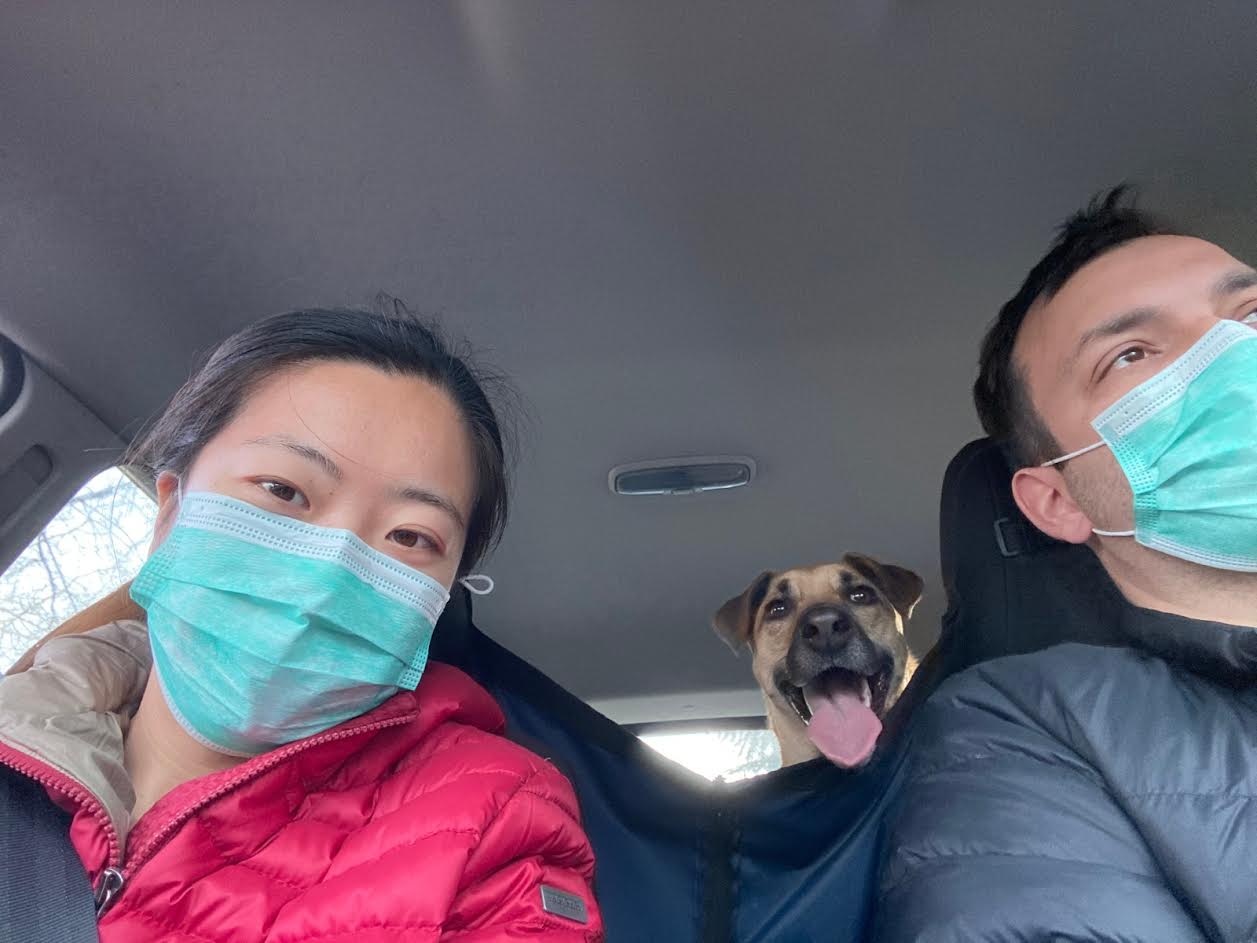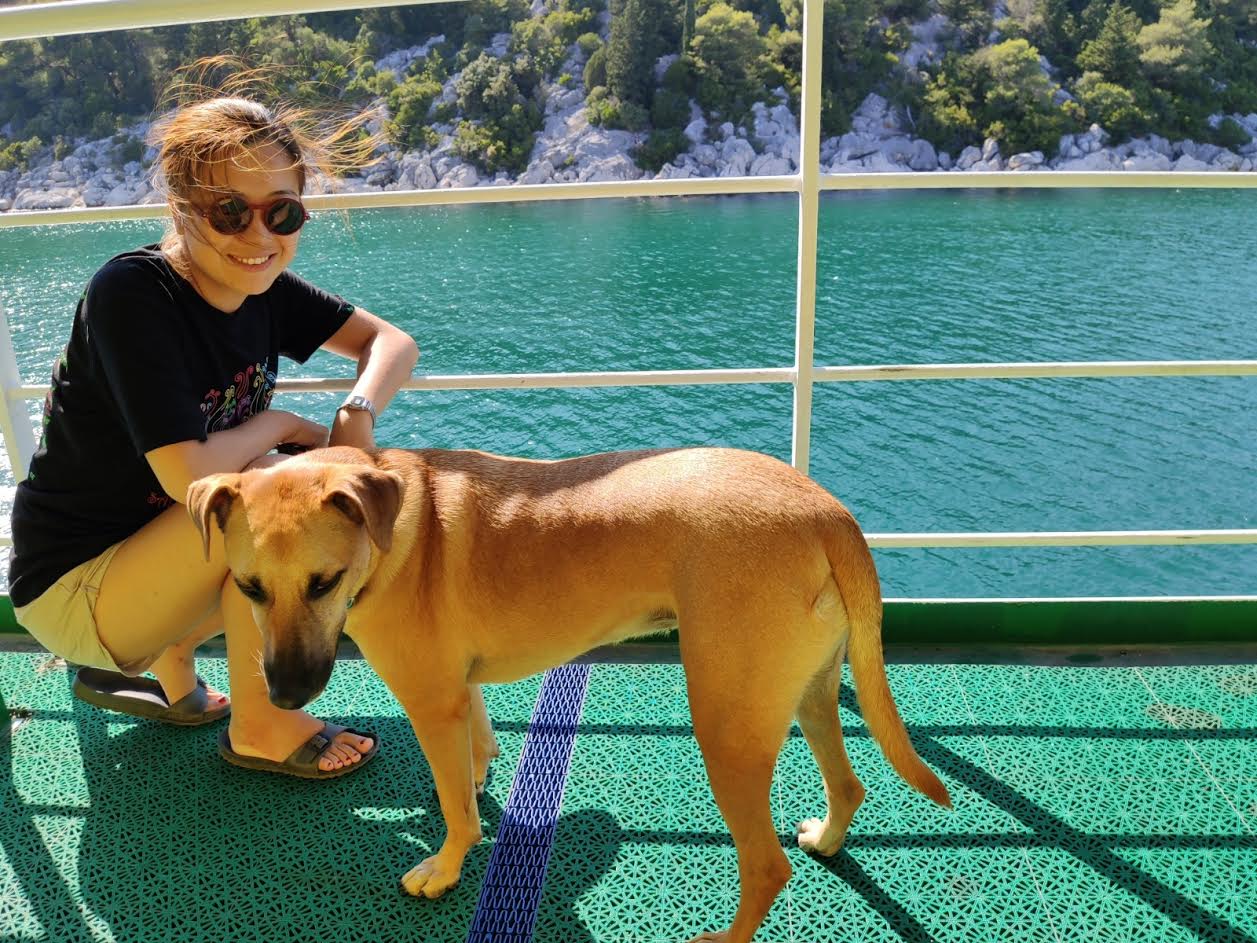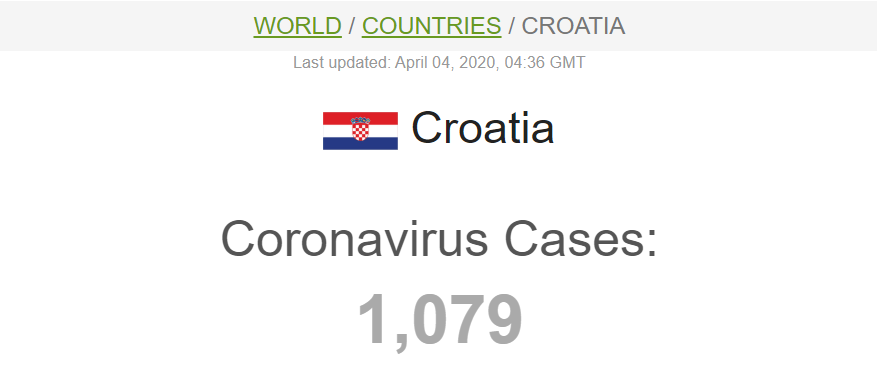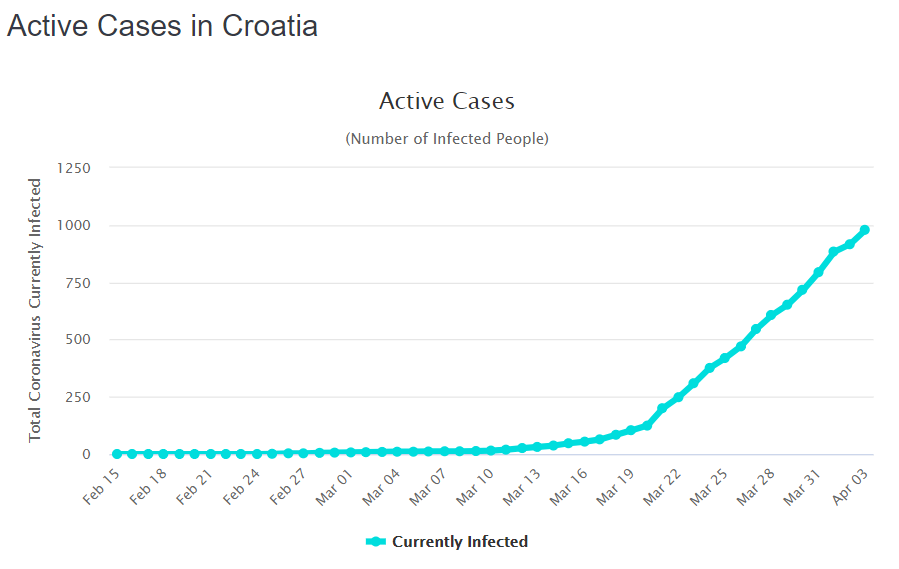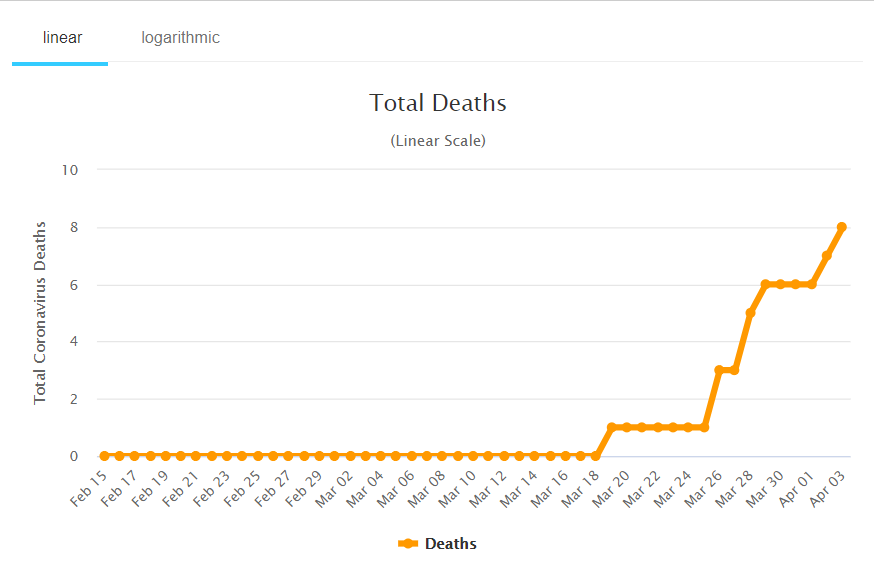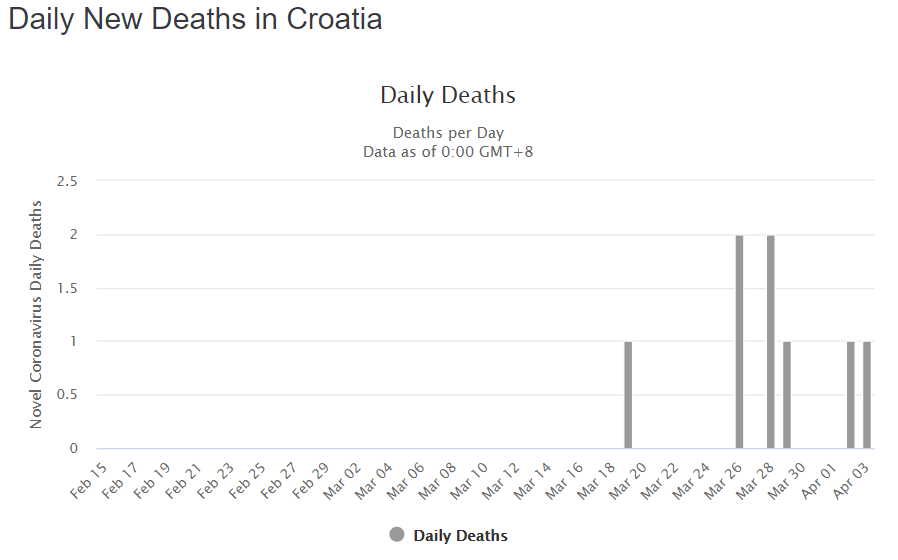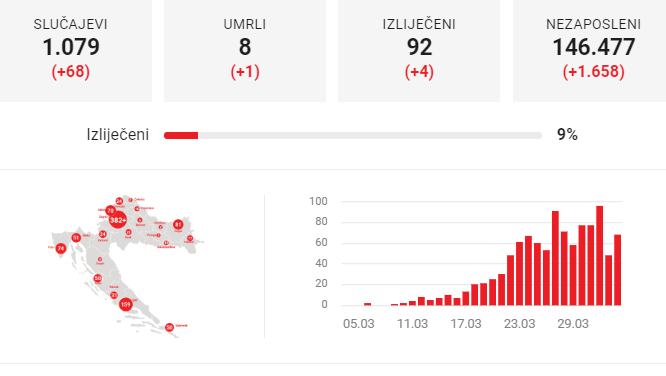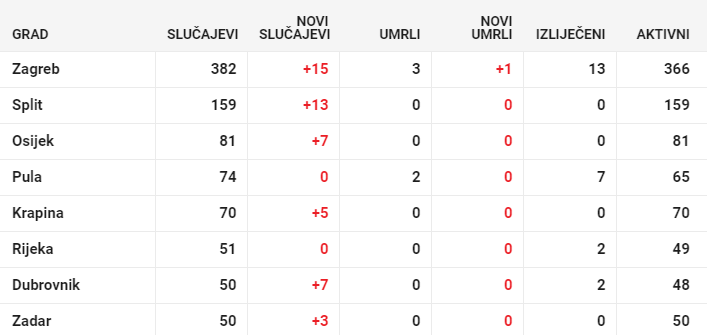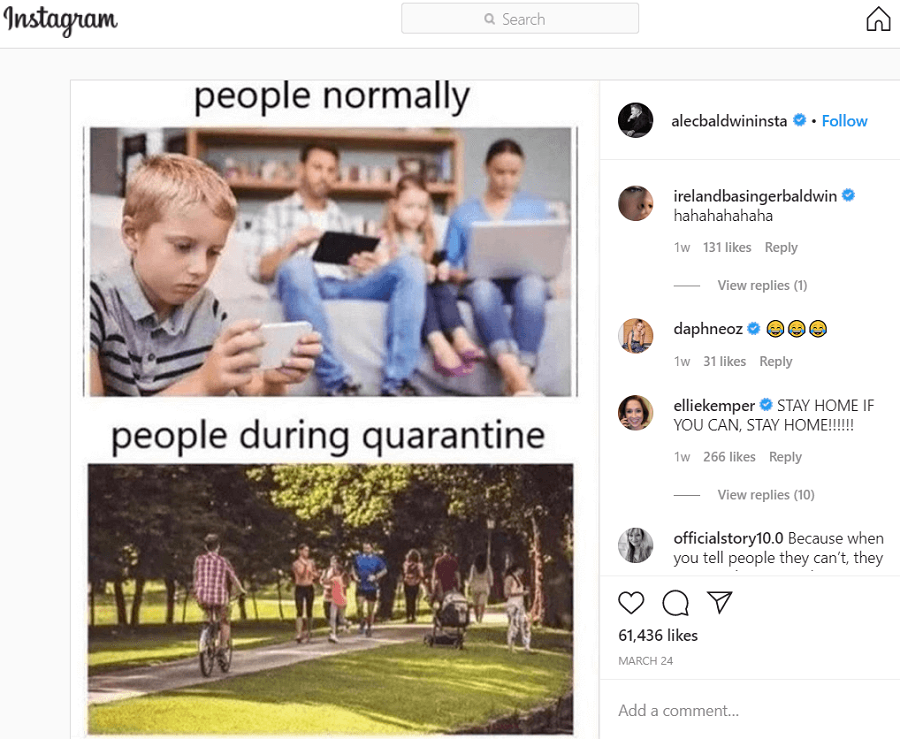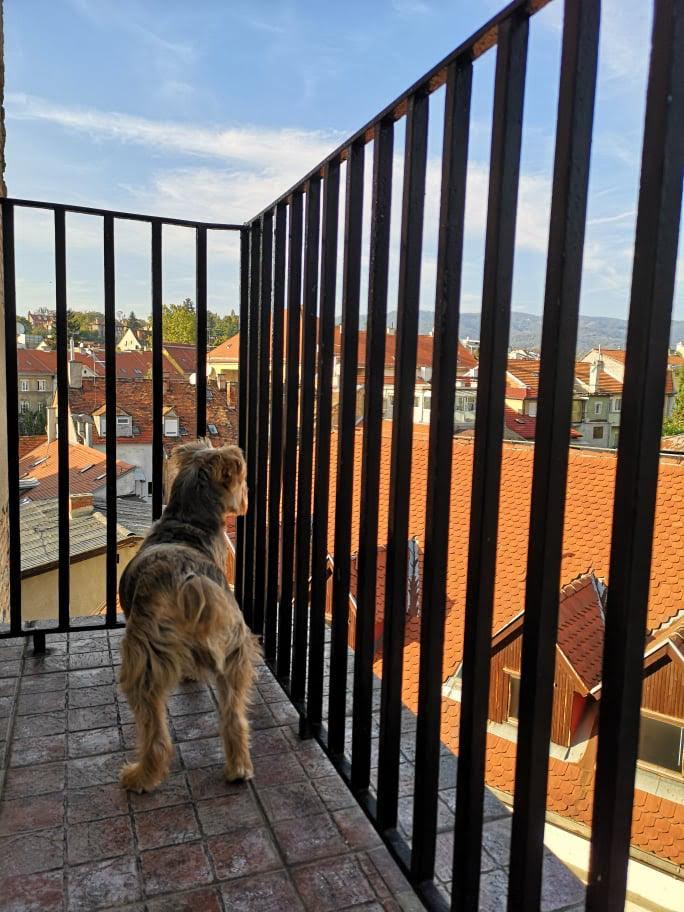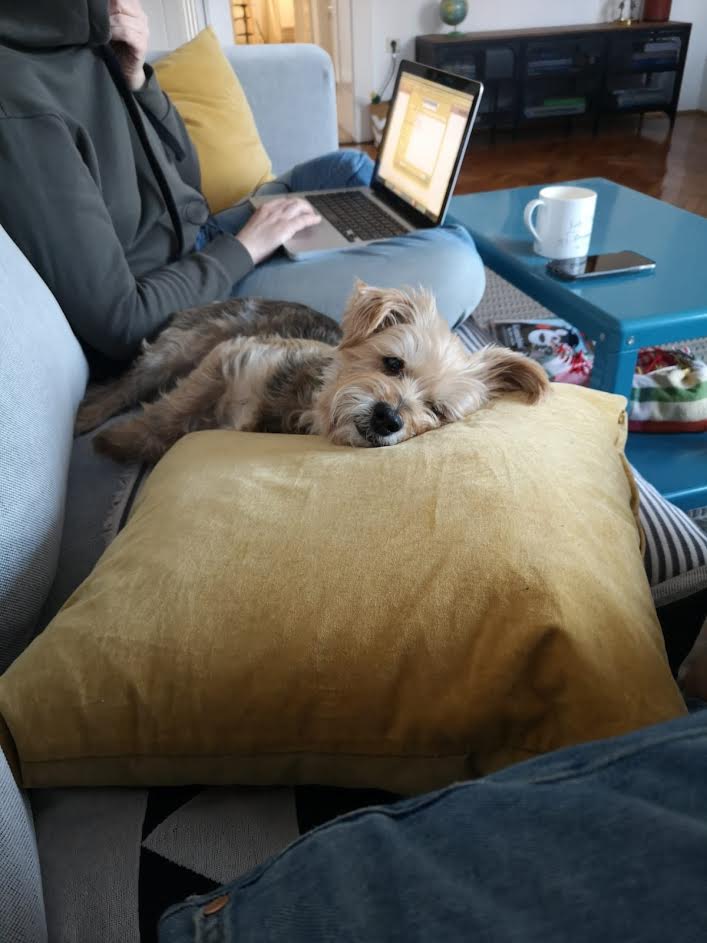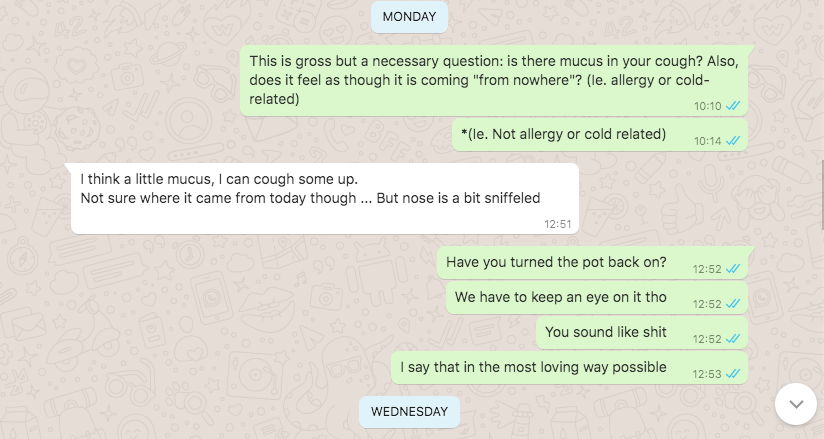Foreigners Self-Isolating in Croatia: Do You Feel Safer? Sisi from China in Zagreb
April 4, 2020 - Do foreigners in Croatia feel more or less safe sitting out COVID-19 here than in their home country, and what are their experiences? A new series on TCN, with Sisi Peng from China in Zagreb as our 23rd contributor.
Oxford University recently published some research on government responses to coronavirus which showed that Croatia currently has the strictest measures in the world. While inconvenient, this is a good thing in terms of reducing the spread of the virus, and I am certainly not alone in my admiration of the official Croatian handling of this crisis in recent weeks, both in terms of action and communication.
But what do other expats here think? And how does it compare with the response in their home country? Would they rather sit this one out here or there? In the first of a new series on TCN, we will be featuring expats from all over the world to see what their views are on life in corona Croatia rather than back home. So far we have heard from expats in Croatia from Romania, USA, Ireland, UK, Mexico, Argentina, Spain, Singapore, Holland, Canada, India, Hong Kong, Venezuela, Latvia and Germany. Next up, Sisi Peng from China in Zagreb with a quite incredible article.
If you would like to contribute to this series, full details are below. Now, over to Sisi.
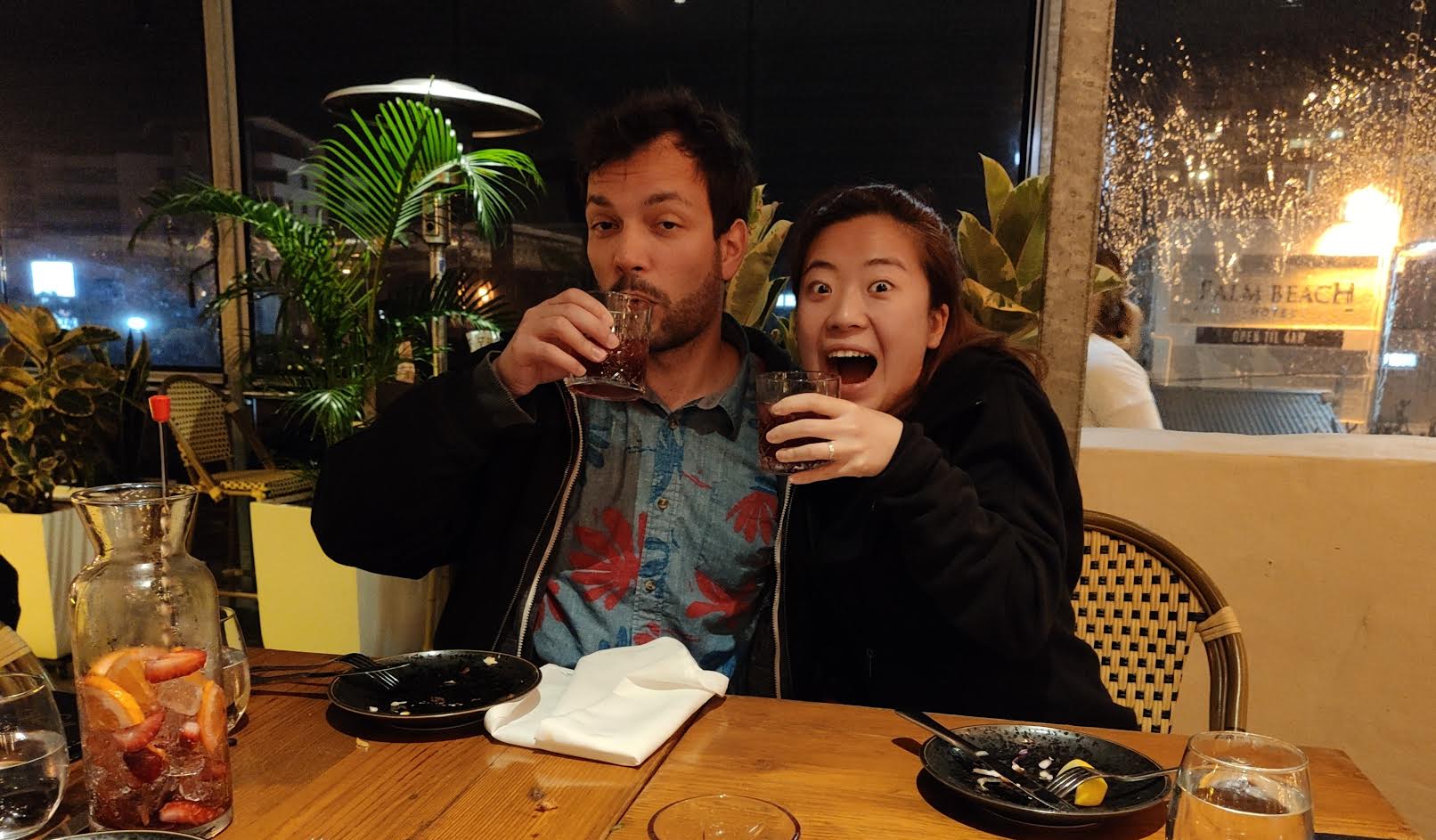
Firstly, how are you? Are you alone/with someone? Tell us a little about your situation and sanity levels.
I am Sisi from China. My Croatian husband and I are doing fine. We have started to stay at home since mid-March. But he has to work half of the day at home and half of the day in the office, which I am not very happy with. We have a two-year-old dog, she keeps me going out twice a day for some fresh air, we’re very thankful for that.
What do you think about the economic measures the government is taking, are they helping your business?
My profession is teaching Chinese language to foreign speakers, but I also cooperate with Croatian hotels, travel and lifestyle brands for creative writing and translation specialised for the Chinese market and promote them in the modern social media framework.
I began freelancing in summer last year. The situation for me in Croatia before the coronavirus was not too bad. For example, some resorts at the seaside had planned to attract more Chinese customers during the 2020 Chinese New Year and during summer, and I was also occupied by several projects at hand. Unfortunately and sadly, now I can hardly imagine doing any of the above.
When did you realise that corona was going to be a big issue?
As a Chinese national living overseas, I have mixed feelings regarding this whole issue. I will write this article in a chronological order from my own perspective.
It started from the beginning of December 2019 in Wuhan, China. The news from China firstly said that it was not a serious virus, that it was controllable and preventable, and that the government asked the people in Wuhan to stay calm. And of course, I did not think too much about it.
January 2020. Life was normal here in Zagreb. The outbreak had already happened in Wuhan and the number of infected people skyrocketed by the end of the month, but more people with symptoms were not even able to get tested. The hospitals were already overloaded, and there was shortage of medical supplies, doctors and nurses worked around the clock and some of them got infected. People reached out for help on Weibo (the Chinese version of Twitter), because normal channels did not really function. We did not know how many people exactly were infected or dead.
January 23. An abrupt official lockdown was announced in Wuhan. An estimated five million people managed to flee from the city before the lockdown, said the Wuhan mayor, another nine million stayed.
January 25. This is the first day of our national holiday. On the same day, a bus with 29 Chinese tourists,18 of whom were from Wuhan, entered Croatia from Italy where they were previously travelling. They were going to Dubrovnik and then to Bosnia. ''Here they come, I hope they are all healthy,'' I was thinking when I saw the news.
January 26. Four Croatian students stuck in Wuhan had an interview on Croatian TV.
I saw that many Chinese people living abroad had started to buy masks in bulk and send them back to families and to hospitals, they were trying to help. Scandals about the Hubei Red Cross appeared and disappeared on Weibo, some local government official sent their drivers to bluntly take away the donated masks in big carton boxes from the distribution centre, while the doctors had to come in person with special approval and wait at the gate to get medical supplies, some doctors came back to the hospital with empty hands.
January 30. Out of worry, my friend and I showed up at a pharmacy and the salesperson said to her colleague that these Chinese girls had surely come to buy masks... We came too late, there were no more N95 masks. But a normal surgical mask costs 2 kuna each. We did not buy many, who would think that this virus would hit Europe fast and hard?
Soon enough, a few cases were found in Europe. I became scared, but my husband and other friends were just relaxed. They tried to calm me down by comparing it with the death toll of Influenza and other flus. “You are overreacting, baby” my husband said. We still went to bars and restaurants.
February 2020. Life still seemed normal in Zagreb but things were changing. I signed up for a three-week Croatian language course at the faculty, but I found it difficult to keep up with, every hour I was overwhelmed by bad news from China, I simply could not focus on the lecture.
February 1. The four Croatian students living in Wuhan were evacuated from the city and quarantined in France for 14 days. Official lockdowns, from city to city, started in China. A very high-level risk warning across the whole country. My family back home said they were doing fine. A new policy was implemented, that only one person from each family was allowed to go out to buy food and necessities every day under an agreed schedule. My friends in Shanghai said they missed eating out. Every single person in China had to wear a mask when going out, no excuses.
February 7. Chinese doctor Li Wenliang was confirmed dead from the coronavirus. He was arrested as a rumour monger when he first warned his other doctor friends on a WeChat (a Chinese application, a combination of WhatsApp and Facebook) group about this mysterious virus before the outbreak. He once said there should be more than one voice in a healthy society. Many Chinese citizens around the world got infuriated on that day, they posted their anger on WeChat, Weibo, Facebook, everywhere. Their posts were deleted within seconds on Chinese platforms. I failed to send my post in the first place because it contained certain sensitive words. I cried so much that night.
I started to feel scared of going out, since people would stare at me or immediately walk away from me on the streets and on trams. One day, three young ladies shouted “Coronavirus!” at me at a tram stop. Another day, my Chinese friend said a similar situation happen to her. I stopped going to yoga and dancing class. I felt anxious.
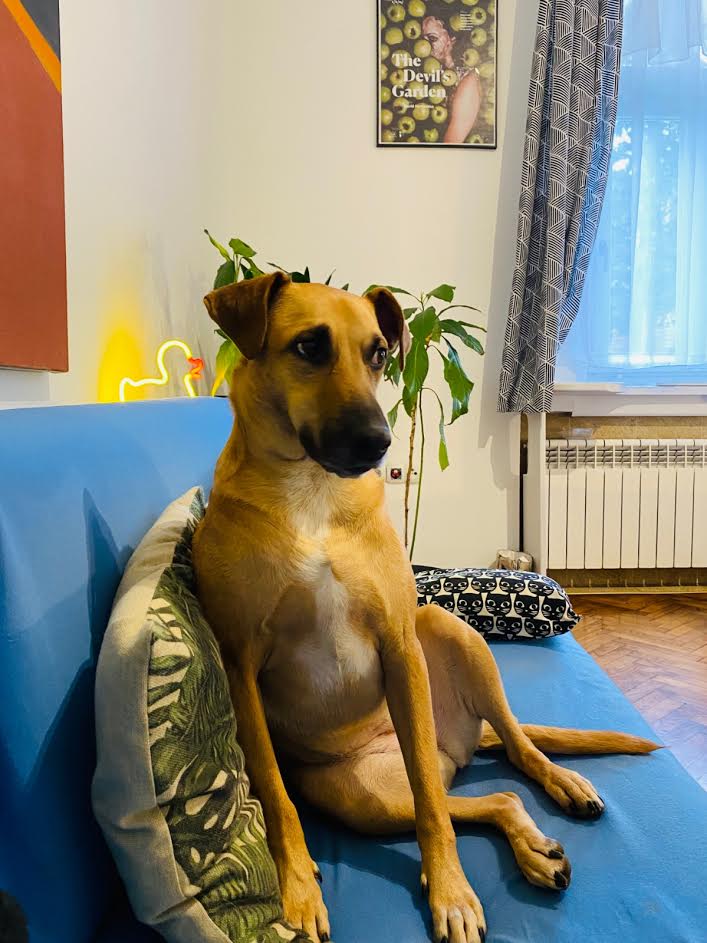
February 25. The first confirmed case in Zagreb, during the same day, I saw people stockpiling in shops. But very few people wore masks in public. I did not have the guts to put on my mask.
March 2020. The coronavirus spread fast in Italy in the beginning of this month, it became another “Wuhan” in Europe. Some world-famous celebrities also got infected. Meanwhile, the number of cases in China slowed down. Many countries have closed their borders during this month. Things were getting worse outside of China.
I signed up for another semester of the Croatian language course. During the first week of school, one Chinese student burst out crying in class when the teacher asked about her recent life in Croatia. She and her husband got seriously abused and harassed at the Carnival Parade in Rijeka, and an old guy in a super market in Zagreb shouted in her face, asking her to get out of his country when he saw her wearing a mask. Xenophobia, racism and violence against Chinese people were on the rise in many countries because of this virus.
I had serious and long talks with my husband about this situation and my worries. I tried to tell him that this was not just another flu. I told him that what was happening in China in the last two months was happening right here and right now. It would be for the best if he could start to work from home and his band should cancel their upcoming concerts (His punk band Mašinko: https://masinko.bandcamp.com/). But again, he was not very convinced and soon left for the rehearsal. “Why are so many European people being ignorant? Look at what is happening now in Italy! And we are their neighbour, are you feeling safe at all?” I tried to control my tone of voice, but I said it desperately.
I started to walk to the faculty and avoid using trams. I went to pharmacies to buy medical alcohol, sanitisers were sold out.
March 10. A student in my class started to cough very hard, the teacher had to stop talking to ask if she was ok. The class of 18 people kept silent as if nothing had happened, and we finished the class on time.
March 11. The coronavirus outbreak was finally confirmed as a world pandemic by the WHO. That morning, the same student showed up again in class with a note from a doctor. She still coughed and sneezed. She claimed that she did not have the coronavirus and that the doctor had proved it. No one said anything, I got surprised and offered a mask to her, but she refused. She said it was not helpful. I sent her a message after school, I told her that she should stay at home and rest first regardless the type of virus she was carrying, adding that this would be the best solution for all of us. She said that she felt a little discriminated by me and reminded me that the coronavirus had come from China.
March 12. I stopped going to the faculty and chose to stay at home. On that day, the faculty issued a formal notice, and asked students who came to Croatia from other countries during the last 14 days to start self-isolation for two weeks. My husband’s concerts were officially cancelled, I took a deep breath.
Still March 12. A Chinese Foreign Ministry spokesperson has suggested that the U.S military could have brought the coronavirus to China, denying it originated in Wuhan --- I was speechless when I saw this news.
March 16. Online classes were launched on Zoom Video. On the first day, we were using it clumsily. Kindergartens, schools and universities all got closed for 14 days. My husband still went to work as usual. I took my dog out for a walk in a nearby forest, I saw kids running outside, more people came out in sports clothes in the early afternoon. “What's the whole point of closing then schools and workplaces, then?” I couldn't stop thinking.
March 20. My husband and I started a new family tradition. Every day when dinner is ready and out on the table, we first pour a shot of rakija for each of us, together saying “Da smo mi živi i zdravi!” out loud, meaning “let us be alive and healthy”!
March 22. A strong earthquake hit Zagreb early in the morning, it was also the first day of the nationwide lockdown in Croatia. We hurried out onto the street and saw other neighbours. We did not wear masks, I went out even without my passport. Everyone looked startled. I have never felt so scared in my life like I did on that day.
March 26. China announced a temporary entry ban for most foreign nationals in an effort to curb the number of imported cases of the coronavirus. My friend back in Shanghai told me that people were getting laid off, but that she still works from home.
March 29. China launched the “health code” service, it runs on WeChat and Alipay which are used by the majority of Chinese people. It gives colour-coded designations to users based on their health status and travel history. A QR code can be scanned by the authorities. A green code means healthy, yellow shows that the holder should be in home isolation. Red shows that the user is a confirmed coronavirus patient and should be in quarantine.
“Will we also adopt this QR code system to have us tested when we go outside to public places in the future?”
What is your impression of the way Croatia is dealing with the crisis? How safe do you feel?
Objectively speaking, Croatia is doing pretty well but at the cost of a potential economic recession. I would feel safer if my husband worked from home completely. But now he is the only one in the office, so it is not so bad. Also, we are ordering food by phone instead of going out to the shops.
I would probably feel safe as well if I was in Shanghai. But it would definitely not be as comfortable and flexible as it is in Croatia. I would probably find it much more difficult to walk my dog in China than in Croatia.
Now compare that to your home country and how they are handling it. What is Croatia doing better/worse?
I am displeased about my country’s stalling when there was a need to react fast in the moment it was obvious that this was a new and serious virus. They could have prevented this disaster from spreading in Wuhan and across the whole world.
But in a manner of speaking, this comparison between Croatia and China is not easy. China is the first country to deal with this virus. Wuhan city has more than 10 million people with a limited number of hospitals. China has deployed the best doctors from different cities to Wuhan to support the local hospitals during the outbreak. They launched many strict restrictions. I also remember Hong Kong hospital staff were on strike, demanding the closure of the Chinese border during that time. This, or any other kind of strike, is very unlikely to happen in China and be exposed on official news.
Other western countries would not do things in such an extreme way that China did and I think Chinese people are more cooperative with the government. They could give up their freedom of movement and stay at home for months and wear masks when the government asks them to.
Compared with Sweden’s approach to the coronavirus, though, I think Croatia is doing the right thing. But again, as a Chinese citizen who witnessed all of this, I think Croatia could have closed schools even earlier and told people to work from home.
What about official communications from the authorities, compared to your home country?
I have seen too much heartbreaking news during the outbreak in China, sometimes the news from the government channel was the opposite from what was being posted temporarily on Weibo. I had to take a snap photo of the news on my phone immediately before it was deleted. I also read news on English portals about situations in China. It was hard to pick up the truth or useful info from tonnes of fake news and propaganda. “Are they hiding the real number or bragging about the victory?” I constantly asked myself, think before you believe it. Meanwhile, I had to tell my family not to trust unofficial and fake advice on protecting themselves from the virus. It was all so exhausting for me.
While I'm in Croatia, I follow TCN portal or use Google Translate to read other Croatian news, but I feel the communication is very straightforward, open and transparent.
What's the one thing you wish you had taken with you into self-isolation.
I wish I had a survival kit at home, because you never know when an earthquake will come during self-isolation.
One thing you have learned about yourself, and one thing you have learned about others during this crisis.
I learned that I am a lucky person but I did not really see it before. After we went through the earthquake and now lockdown, we remain mentally strong as a whole family, which is very precious.
About Sisi:
I came back to Zagreb from Shanghai in July 2019, where my husband spent about one year learning advanced Chinese language with a scholarship, meanwhile, we took this opportunity as a gap year to explore the country together.
My profession is teaching Chinese language to foreign speakers, but I also cooperate with Croatian hotels, travel and lifestyle brands for creative writing and translation specialised for the Chinese market and promote them in a modern social media framework.
Please feel free to contact me if you or your child is interested in learning Chinese online during this home quarantine period or you need anything translated. Contact: This email address is being protected from spambots. You need JavaScript enabled to view it.
Thanks, Sisi, stay safe and see you on the other side.
TCN is starting a new feature series on foreign experiences of sitting out COVID-19 here in Croatia compared to their home country. If you would like to contribute, the questions are below. Please also include a para about yourself and where you are from, and a link to your website if you would like. Please also send 3-4 photos minimum to This email address is being protected from spambots. You need JavaScript enabled to view it. Subject Corona Foreigner
If you would be interested to record a video version for our partners www.rplus.video please let us know in the email. Thanks and stay safe.
Foreigners Self-Isolating in Croatia: Do You Feel Safer Than in Your Home Country?
Firstly, how are you? Are you alone/with someone? Tell us a little about your situation and sanity levels.
What do you think about the economic measures the government is taking, are they helping your business? (PLEASE IGNORE IF THIS DOES NOT AFFECT YOU)
When did you realise that corona was going to be a big issue?
What is your impression of the way Croatia is dealing with the crisis? How safe do you feel?
Now compare that to your home country and how they are handling it. What is Croatia doing better/worse?
What about official communications from the authorities, compared to your home country?
What's the one thing you wish you had taken with you into self-isolation.
One thing you have learned about yourself, and one thing you have learned about others during this crisis.
TCN has recently become a partner in Robert Tomic Zuber's new R+ video channel, initially telling stories about corona experiences. You can see the first TCN contribution from this morning, my video from Jelsa talking about the realities of running a news portal in the corona era below. If you would like to also submit a video interview, please find Robert's guidelines below
VIDEO RECORDING GUIDE
The video footage should be recorded so that the cell phone is turned horizontally (landscape mode).
There are several rules for television and video news:- length is not a virtue- a picture speaks more than a thousand words
In short, this would mean that your story should not last more than 90 seconds and that everything you say in the report should be shown by video (for example, if you talk about empty streets, we should see those empty streets, etc.).
How to do it with your cell phone? First, use a selfie camera to record yourself telling your story for about a minute and a half. Ideally, it would be taken in the exterior, except in situations where you are reporting on things in the interior (quarantine, hospital, self-isolation, etc.). Also, when shooting, move freely, make sure everything is not static.
After you have recorded your report, you should capture footage that will tell your story with a picture, such as an earlier example with empty streets.
One of the basic rules of TV journalism is that the story is told in the same way as a journalist with his text. Therefore, we ask you for additional effort. Because we work in a very specific situation, sometimes you may not be able to capture footage for each sentence of the report. In this case, record the details on the streets: people walking, the main features of the city where you live, inscriptions on the windows related to the virus, etc.
The same rules apply if you are shooting a story from your apartment, self-isolation, quarantine. We also need you to capture footage that describes your story.
When shooting frames to cover your reports, it is important that you change the angle of the shot (in other words, shoot that empty street from several angles). Also, when shooting a detail, count at least five seconds before removing the camera to another detail.
The material should be about 5 minutes long (90 seconds of your report + frames to cover your story).
After recording everything, send us to Zagreb, preferably via WeTransfer to This email address is being protected from spambots. You need JavaScript enabled to view it.
Detailed Croatian COVID-19 Graphs Now Available on Worldometers Info Website.
April 4, 2020 - Worldometers.info is one of the most popular websites in the world right now, and now there are much more detailed coronavirus statistics available for Croatia for the first time.
It has become an essential accessory in the corona age - Worldometers.info, the statistics site which carries the latest and most comprehensive data about the current pandemic.
Updated in real time, the Worldometers team are doing a phenomenal job at keeping the world updated on the latest situation of numbers of cases, deaths, active and serious cases. In recent days, they have added new tables - cases/1m population, deaths/1 million population, total tests, and test/1m population.
You can see how Croatia is doing in all these here.
But some great news this morning for Croatian corona stats addicts, as Croatia has been added to the countries where Worldometers is offering more detailed breakdowns of data.
Croatia now has its own dedicated page on the site.
The official government website already has charts on cumulative cases and recoveries, as well as daily new cases, but Worldometers offers a little more, including a chart of current active cases in Croatia.
A cumulative chart of total deaths.
And a chart of daily deaths in Croatia.
My experience of the website is that things are updated in real time in general.
Croatia currently releases its daily numbers at the official press conference by the National Civil Protection Headquarters at 14:00.
Another source of statistics from the corona crisis is Croatian news portal Index.hr, which is also tracking the growth in unemployment with a daily update on its homepage.
Index also has a very helpful breakdown of cases by location in Croatia, with fields for total cases, new additions that day, total deaths, new deaths that day, and recoveries.
For the latest COVID-19 coverage from Croatia, check out the TCN dedicated section.
Opposition Supports Rescue Package, Slams Government for Being Late
ZAGREB, April 3, 2020 - Opposition parties said in parliament on Friday that they would support the so-called April set of measures proposed by the government to mitigate the fallout from the corona crisis, however, they criticised the government that it was late in proposing the measures.
Social Democratic Party (SDP) leader Davor Bernardić said that the proposals with the measures were put forward belatedly since thousands of people were losing their jobs.
He recalled that this strongest Opposition party suggested that the compensation for keeping workers on a company's payroll should be 5,100 kuna instead of the government measure providing for HRK 4,000 per employee per month.
The SDP also calls for dues to be written-off rather than just being deferred, he said.
Croatian Peasant Party (HSS) leader Krešo Beljak agreed with Bernardić's assessment that the government was late in preparing the rescue measures.
Beljak called for the immediate adoption of measures aimed at propping up businesses and farms in the agricultural sector.
"This is an opportunity for Croatia to reset itself and offset the last 30 years when foreign importers and interest groups and retail chains were given preferential treatment," said Beljak.
Emil Daus of the Istrian Democratic Party (IDS) called for more resolute support to the agricultural sector.
Mirando Mršić of the Democrats criticised the government for addressing the problems in a non-energetic manner.
Goran Alekšić of the SNAGA party called for a ban on enforcement procedures, a moratorium on loan repayments, and for all monthly salaries to be reduce to an equal amount.
The MOST party also advocates a moratorium on loan repayments.
Croatian Democratic Union (HDZ) whip Branko Bačić dismissed the accusations of the government being late in addressing the corona crisis issues. He said that on 9 January, the government set up a task force to monitor the developments considering the coronavirus epidemic in China.
On 25 January, the Croatian government introduced some measures in seaports and airports, and soon after that a crisis management team was established, Bačić said.
"The Croatian government was expedient in engaging itself in efforts to curb the epidemic, and has achieved excellent results. Only Japan has had better results than we have in coping with the crisis," he said.
Furthermore, the rescue package aimed at propping up the economy accounts for nine percent of Gross Domestic Product, he added.
More economic news can be found in the Business section.
Foreigners Self-Isolating in Croatia: Do You Feel Safer? Mara from Latvia in Zagreb
April 3, 2020 - Do foreigners in Croatia feel more or less safe sitting out COVID-19 here than in their home country, and what are their experiences? A new series on TCN, with Mara Vitols-Hrgetic from Latvia in Zagreb as our 22nd contributor.
Oxford University recently published some research on government responses to coronavirus which showed that Croatia currently has the strictest measures in the world. While inconvenient, this is a good thing in terms of reducing the spread of the virus, and I am certainly not alone in my admiration of the official Croatian handling of this crisis in recent weeks, both in terms of action and communication.
But what do other expats here think? And how does it compare with the response in their home country? Would they rather sit this one out here or there? In the first of a new series on TCN, we will be featuring expats from all over the world to see what their views are on life in corona Croatia rather than back home. So far we have heard from expats in Croatia from Romania, USA, Ireland, UK, Mexico, Argentina, Spain, Singapore, Holland, Canada, India, Hong Kong, Venezuela and Germany. Next up, Mara Vitols-Hrgetic from Latvia, who runs the fabulous Forum Congress Centre in Zagreb with husband Josip.
If you would like to contribute to this series, full details are below. Now, over to Mara.
Firstly, how are you? Are you alone/with someone? Tell us a little about your situation and sanity levels.
I'm physically fine. I'm with my husband and my daughter - who is a doctor, so that gives us a high dose of peace. Our business (a venue for all kind of business events) is closed, by now we have more than 150 cancelled events. Although I'm answering as a Latvian living in Zagreb, I was born in Venezuela and lived there for almost 45 years, so my sanity levels are normal, because we've been training for 20 years to live in adverse circumstances.
What do you think about the economic measures the government is taking, are they helping your business?
Yes, and very much! We are grateful, because the government saved us, paying the „support for job security“ and delaying taxes. It's impossible to predict when will the pandemic be over. On the other side, we are not as a bakery, for example, who can open doors and sell bread the very next day the measures are softened. We will have to wait at least a week for the first tiny event...
I would like to add that I'm very proud of the government (and the citizens too). Croatia suffered not only from the Covid-19, but also from an earthquake. The government had to cope with a tragedy inside another tragedy, and none of them was their fault. And I think they've been doing a great job in very hard circumstances.
When did you realise that corona was going to be a big issue?
When Italy locked down. I have friends and nephews living in Lombardia, so I was horrified with the stories and numbers. Then we started to read more about the history of epidemics and we realized that we were living one. Almost every century has had an epidemic... The problem is we don't' know how big this issue is gonna be...
What is your impression of the way Croatia is dealing with the crisis? How safe do you feel?
I feel very, very safe. Our „Fantastic 4“ is a great team. They are so professional, that almost everybody is obeying their indications and restrictions with pleasure – just some „kafić breaks“ on the coast : ) And everybody is playing an important role. I was impressed when the Army built 25 tents (completely equipped for coronavirus patients) in just 3 days, in front of the KBC Dubrava! And I was truly moved when I saw the Bad Blue Boys carrying the newborn babies from the maternity...
Croatia and Latvia have very similar numbers. Croatia has 263 cases p/1M pop, Latvia has 261. Croatia has 2 deaths p/1M pop, Latvia has 0.5.
Croatia has stronger measures than Latvia - for example, in Latvia the public transport is still working under some limitations (less passangers allowed to travel together, less routes and vehicles, etc.) But reading the news about Latvia is like reading about Croatia: government talking about economic measures to help companies, companies encouraging employees to work from home, home converted into school, school on TV, students printing 3D visors and donating them to hospitals...
The secret of Latvia's success is its people – Latvia is known as „The singing nation“ and Latvian are known as Europe's introverts. They don't have any problem being with themselves...
And you don't have this „kafić culture“ in Latvia : )
What about official communications from the authorities, compared to your home country?
In Latvia the government, institutes and the politicians are very active using their Twitter accounts and giving all needed information to the citizens. There is not a „Civil protection crisis headquarters“ as the Krizni stožer in Croatia. But Latvia is a small nation (about 2M pop) and the authorities are easy to find and meet. Latvia's President, Egils Levits, is a good and old friend of mine and immediately sent me a message after the earthquake : )
What's the one thing you wish you had taken with you into self-isolation.
My youngest son, who's living in Latvia : ) The other son and my daughter are in Croatia, and that's such a good feeling : )
One thing you have learned about yourself, and one thing you have learned about others during this crisis
I can't talk about the crisis alone. In my case, I can't divide the epidemic from the earthquake. When we left our building after the first earthquake, my daughter, dog and I – leaving my husband, who was in self-isolation and didn't want to break it - and we realized that it was snowing, I thought: „what is going on?“. We were sitting on the grass – at a good distance from other neighbours, as everybody did – and then we saw a patient escaping from the hospital, wearing just underpants. It was like in the movies about the end of the world... That day I realized that we are nothing and we decide very little. I realized how fragile I was – how fragile we all are... We were fighting against two powerful and invisible forces, who could destroy so much! Mother Nature fighting back... It took me some time to accept it, to regain balance and self-confidence and to understand that man and nature (including epidemics) have been always living together.
The other thing I've learned (not really learned, but confirmed) was that humans can be so kind and solidary in bad times... if they could only remember that in good times : )
Thanks, Mara, stay safe and see you on the other side.
TCN is starting a new feature series on foreign experiences of sitting out COVID-19 here in Croatia compared to their home country. If you would like to contribute, the questions are below. Please also include a para about yourself and where you are from, and a link to your website if you would like. Please also send 3-4 photos minimum to This email address is being protected from spambots. You need JavaScript enabled to view it. Subject Corona Foreigner
If you would be interested to record a video version for our partners www.rplus.video please let us know in the email. Thanks and stay safe.
Foreigners Self-Isolating in Croatia: Do You Feel Safer Than in Your Home Country?
Firstly, how are you? Are you alone/with someone? Tell us a little about your situation and sanity levels.
What do you think about the economic measures the government is taking, are they helping your business? (PLEASE IGNORE IF THIS DOES NOT AFFECT YOU)
When did you realise that corona was going to be a big issue?
What is your impression of the way Croatia is dealing with the crisis? How safe do you feel?
Now compare that to your home country and how they are handling it. What is Croatia doing better/worse?
What about official communications from the authorities, compared to your home country?
What's the one thing you wish you had taken with you into self-isolation.
One thing you have learned about yourself, and one thing you have learned about others during this crisis.
TCN has recently become a partner in Robert Tomic Zuber's new R+ video channel, initially telling stories about corona experiences. You can see the first TCN contribution from this morning, my video from Jelsa talking about the realities of running a news portal in the corona era below. If you would like to also submit a video interview, please find Robert's guidelines below
VIDEO RECORDING GUIDE
The video footage should be recorded so that the cell phone is turned horizontally (landscape mode).
There are several rules for television and video news:- length is not a virtue- a picture speaks more than a thousand words
In short, this would mean that your story should not last more than 90 seconds and that everything you say in the report should be shown by video (for example, if you talk about empty streets, we should see those empty streets, etc.).
How to do it with your cell phone? First, use a selfie camera to record yourself telling your story for about a minute and a half. Ideally, it would be taken in the exterior, except in situations where you are reporting on things in the interior (quarantine, hospital, self-isolation, etc.). Also, when shooting, move freely, make sure everything is not static.
After you have recorded your report, you should capture footage that will tell your story with a picture, such as an earlier example with empty streets.
One of the basic rules of TV journalism is that the story is told in the same way as a journalist with his text. Therefore, we ask you for additional effort. Because we work in a very specific situation, sometimes you may not be able to capture footage for each sentence of the report. In this case, record the details on the streets: people walking, the main features of the city where you live, inscriptions on the windows related to the virus, etc.
The same rules apply if you are shooting a story from your apartment, self-isolation, quarantine. We also need you to capture footage that describes your story.
When shooting frames to cover your reports, it is important that you change the angle of the shot (in other words, shoot that empty street from several angles). Also, when shooting a detail, count at least five seconds before removing the camera to another detail.
The material should be about 5 minutes long (90 seconds of your report + frames to cover your story).
After recording everything, send us to Zagreb, preferably via WeTransfer to This email address is being protected from spambots. You need JavaScript enabled to view it.
Foreigners Self-Isolating in Croatia: Do You Feel Safer? Josip from Venezuela in Zagreb
April 3, 2020 - Do foreigners in Croatia feel more or less safe sitting out COVID-19 here than in their home country, and what are their experiences? A new series on TCN, with Josip Hrgetic from Venezuela in Zagreb as our 21st contributor.
Oxford University recently published some research on government responses to coronavirus which showed that Croatia currently has the strictest measures in the world. While inconvenient, this is a good thing in terms of reducing the spread of the virus, and I am certainly not alone in my admiration of the official Croatian handling of this crisis in recent weeks, both in terms of action and communication.
But what do other expats here think? And how does it compare with the response in their home country? Would they rather sit this one out here or there? In the first of a new series on TCN, we will be featuring expats from all over the world to see what their views are on life in corona Croatia rather than back home. So far we have heard from expats in Croatia from Romania, USA, Ireland, UK, Mexico, Argentina, Spain, Singapore, Holland, Canada, India, Hong Kong and Germany. Next up, Josip Hrgetic from Venezuela, who runs the fabulous Forum Congress Centre in Zagreb with lovely wife Mara.
If you would like to contribute to this series, full details are below. Now, over to Josip.
Firstly, how are you? Are you alone/with someone? Tell us a little about your situation and sanity levels.
Thank God, everything is good, seeing how this Chinese virus could paralyze the world in just weeks. I am now with part of my family at home, waiting for the news moment by moment.
What do you think about the economic measures the government is taking, are they helping your business?
The measures that have been taken I must say are good. Unfortunately for businesses like ours, which lose 100% every month, nothing will ever be good enough, (We have a meeting center) but when you see the whole situation, I think the government has made a significant effort. It is definitely supporting private businesses.
When did you realise that corona was going to be a big issue?
At first I thought it would be a bad flu. In Venezuela we are used to massive infections of this type. Between 2014 and 2018 we had 2 epidemics (Chikungunya and Zika) which infected more than 70% of the population, that is more than 20 million people, and everything remained normal. But in this case, I understood how bad it was when the NBA suspended the entire basketball tournament in the USA, as well as the MLB for baseball. I thought, "If these business monsters suspend and stop collecting billions of USD, this is bigger than we think." At that time in the USA, nothing had happened yet.
What is your impression of the way Croatia is dealing with the crisis? How safe do you feel?
I think the effort Croatia has made has been formidable. The government understood that they couldn’t afford to have half the country infected, because Croatia does not have the health infrastructure to deal with this emergency. For me, what they have done so far is the right thing to do: keep the contagion curve low and avoid the scenarios of Italy and Spain. Yes, so far I feel safe with the measures taken.
Now compare that to your home country and how they are handling it. What is Croatia doing better/worse?
Venezuela took radical measures, but it is for another reason, in Venezuela in these last four years there are no medicines, and in this last year there is no gasoline. For example, in Caracas, a city of 5 million inhabitants, there is only ONE gas station working. That is why the government took advantage of the moment to send everyone home with the excuse that it is motivated by the Coronavirus, without a doubt that this will save many lives. Croatia is doing something similar in another way but it has also restricted public transport and meetings in social areas such as hotels, restaurants or meeting centers.
What about official communications from the authorities, compared to your home country?
There is no comparison, in Venezuela it is plain and simple political propaganda of the regime, which is why the numbers very different from reality. There are no official health statistics from 2016. While in Croatia every day Ministers and representatives from medical institutes and institutions appear in the different media, in Venezuela only politicians.
What's the one thing you wish you had taken with you into self-isolation?
I was isolated for a week at my family home. Thank God today with the internet and the phone you can be connected to everyone, I can not say that I was missing anything.
One thing you have learned about yourself, and one thing you have learned about others during this crisis.
I confirmed my theory that I love statistics, these days I have made all kinds of tables related to the disease, its evolution and how this can be reflected in other countries. From others, I must admit that I have been amazed at how organized Croats are as a nation. They do not realize how valuable they are in difficult times. In moments of tranquility, I get frustrated at the amount of time they spend criticizing everyone while sitting in a cafe, but they are a highly organized nation, with an excellent sense of collectivity in pressing moments.
Thanks, Josip, stay safe and see you on the other side.
TCN is starting a new feature series on foreign experiences of sitting out COVID-19 here in Croatia compared to their home country. If you would like to contribute, the questions are below. Please also include a para about yourself and where you are from, and a link to your website if you would like. Please also send 3-4 photos minimum to This email address is being protected from spambots. You need JavaScript enabled to view it. Subject Corona Foreigner
If you would be interested to record a video version for our partners www.rplus.video please let us know in the email. Thanks and stay safe.
Foreigners Self-Isolating in Croatia: Do You Feel Safer Than in Your Home Country?
Firstly, how are you? Are you alone/with someone? Tell us a little about your situation and sanity levels.
What do you think about the economic measures the government is taking, are they helping your business? (PLEASE IGNORE IF THIS DOES NOT AFFECT YOU)
When did you realise that corona was going to be a big issue?
What is your impression of the way Croatia is dealing with the crisis? How safe do you feel?
Now compare that to your home country and how they are handling it. What is Croatia doing better/worse?
What about official communications from the authorities, compared to your home country?
What's the one thing you wish you had taken with you into self-isolation.
One thing you have learned about yourself, and one thing you have learned about others during this crisis.
TCN has recently become a partner in Robert Tomic Zuber's new R+ video channel, initially telling stories about corona experiences. You can see the first TCN contribution from this morning, my video from Jelsa talking about the realities of running a news portal in the corona era below. If you would like to also submit a video interview, please find Robert's guidelines below
VIDEO RECORDING GUIDE
The video footage should be recorded so that the cell phone is turned horizontally (landscape mode).
There are several rules for television and video news:- length is not a virtue- a picture speaks more than a thousand words
In short, this would mean that your story should not last more than 90 seconds and that everything you say in the report should be shown by video (for example, if you talk about empty streets, we should see those empty streets, etc.).
How to do it with your cell phone? First, use a selfie camera to record yourself telling your story for about a minute and a half. Ideally, it would be taken in the exterior, except in situations where you are reporting on things in the interior (quarantine, hospital, self-isolation, etc.). Also, when shooting, move freely, make sure everything is not static.
After you have recorded your report, you should capture footage that will tell your story with a picture, such as an earlier example with empty streets.
One of the basic rules of TV journalism is that the story is told in the same way as a journalist with his text. Therefore, we ask you for additional effort. Because we work in a very specific situation, sometimes you may not be able to capture footage for each sentence of the report. In this case, record the details on the streets: people walking, the main features of the city where you live, inscriptions on the windows related to the virus, etc.
The same rules apply if you are shooting a story from your apartment, self-isolation, quarantine. We also need you to capture footage that describes your story.
When shooting frames to cover your reports, it is important that you change the angle of the shot (in other words, shoot that empty street from several angles). Also, when shooting a detail, count at least five seconds before removing the camera to another detail.
The material should be about 5 minutes long (90 seconds of your report + frames to cover your story).
After recording everything, send us to Zagreb, preferably via WeTransfer to This email address is being protected from spambots. You need JavaScript enabled to view it.
Foreigners Self-Isolating in Croatia: Do You Feel Safer? Tanja from Australia in Vrana
April 3, 2020 - Do foreigners in Croatia feel more or less safe sitting out COVID-19 here than in their home country, and what are their experiences? A new series on TCN, with Tanja Polegubic from Australia in Vrana as our 20th contributor.
Oxford University recently published some research on government responses to coronavirus which showed that Croatia currently has the strictest measures in the world. While inconvenient, this is a good thing in terms of reducing the spread of the virus, and I am certainly not alone in my admiration of the official Croatian handling of this crisis in recent weeks, both in terms of action and communication.
But what do other expats here think? And how does it compare with the response in their home country? Would they rather sit this one out here or there? In the first of a new series on TCN, we will be featuring expats from all over the world to see what their views are on life in corona Croatia rather than back home. So far we have heard from expats in Croatia from Romania, USA, Ireland, UK, Mexico, Argentina, Spain, Singapore, Holland, Canada, India, Hong Kong and Germany. Next up, Tanja Polegubic from Australia in Vrana. As an Aussie, I wondered how much toilet paper she had stockpiled as an additional question. Her answer was superb, and had she written it by hand on some toilet paper, it would have taken up most of a whole dunny roll. You can read it here.
If you would like to contribute to this series, full details are below. Now, over to Tanja.
1. Firstly, how are you? Are you alone/with someone? Tell us a little about your situation and sanity levels.
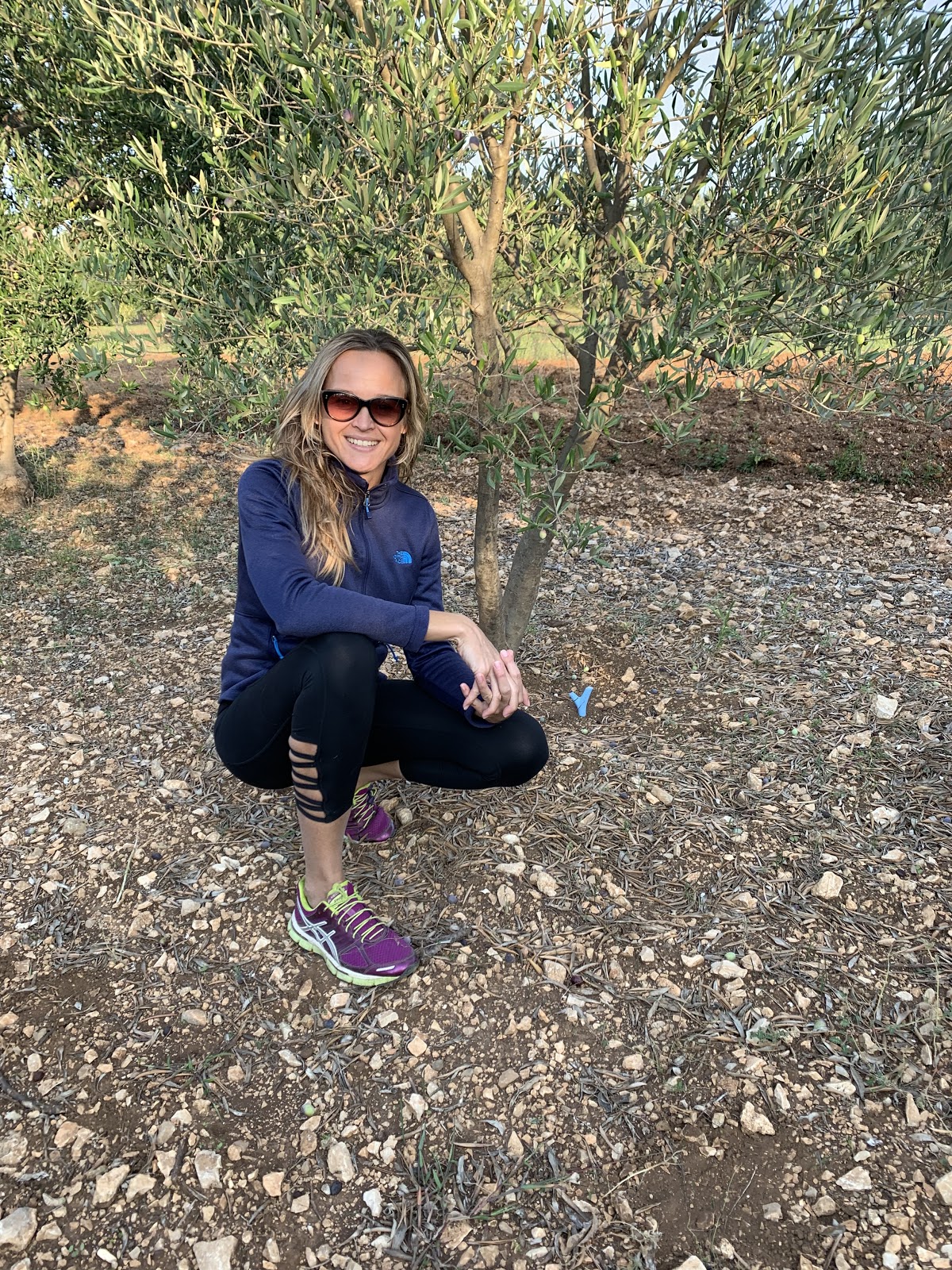
I’m keeping well. I’m on my own, in Vrana, a farming village in Dalmatia. Before this I was in Split but our cowork space is now closed. And my closest neighbours - who have kept the tobacco industry afloat for decades - ramped up their habit so I got smoked outta there.
I’m working on a new project and ongoing Australian outsourcing business, which we expect will surge as remote work just went mainstream.
My situation:
Like many people in my circle, I’m making the most of this time. Forwarding memes. Reading books on my wishlist. Writing. Connecting over voice or video calls. Working on personal projects I’ve had in the pipeline. It’s been a blend of productivity and stillness.
I video call my mum who shows me the exceptional lettuce in her back garden. She has to stay home as I’ve banned her from leaving - like many adult children I know around the world. My only routine is on Sundays, where we hold virtual cocktails between London, Spruce Pine North Carolina, Split, Vrana, Trolokve….
Home Office:
One of the things that’s different - I’m not moving around so much, so I pimped the ironing board into a standing desk. [See Photo].
There are days I’m on the screen a hell of a lot. In the morning, it’s catching up on Croatia and Europe. By the evening, it’s to see the latest in Australia - and particularly my hometown Canberra. I’ve really limited this now, and opting for more analogue activities. It’s too much.
Amid scrolling through the sad and sombre, there’s a lot of funny stuff people are sharing. I’m most grateful for this. While I’m balancing feeling a sense of global grief, looking back on when our own dad died, it’s what got us through. Even him, I like to think. He was joking the night before - and we also started to joke about things pretty soon after he passed. I discovered my sister-in-law is one of the funniest people on earth. And seeing more now. I think everyone just has to deal with heaviness in their own way. Turns out my coping DNA is in my funny bone.
Otherwise, watching clouds and sheep is about as exciting as my day gets.
2. When did you realise that corona was going to be a big issue?
On 1 March I posted a “preparations - on the eve of a pandemic” list. A bit of a joke, but also a loose game plan. The pandemic was declared about 10 days later.
Watching Italy, it was - and still feels, surreal. I studied in Milan and the North of Italy for my masters back in 2014/15. Through this, I have a friend from outside Bergamo who lives in London. Plus her mum is from Spain. She said “she wishes the world would take this more seriously”. This was mid-March and sounded so broken-hearted, I think that was my heart’s first major COVID19 tear.
The penny completely dropped for me on 17th March.
With borders closing, I realised I may not be able to get to Australia. It was the first taste of what not getting to my immediate family would feel like. I expect many feel this way. “A double anxiety” as one friend put it. Be it across oceans, states or even hospital doorways.
This is how hard-hitting this is - and will get.
There’s nothing funny about this part.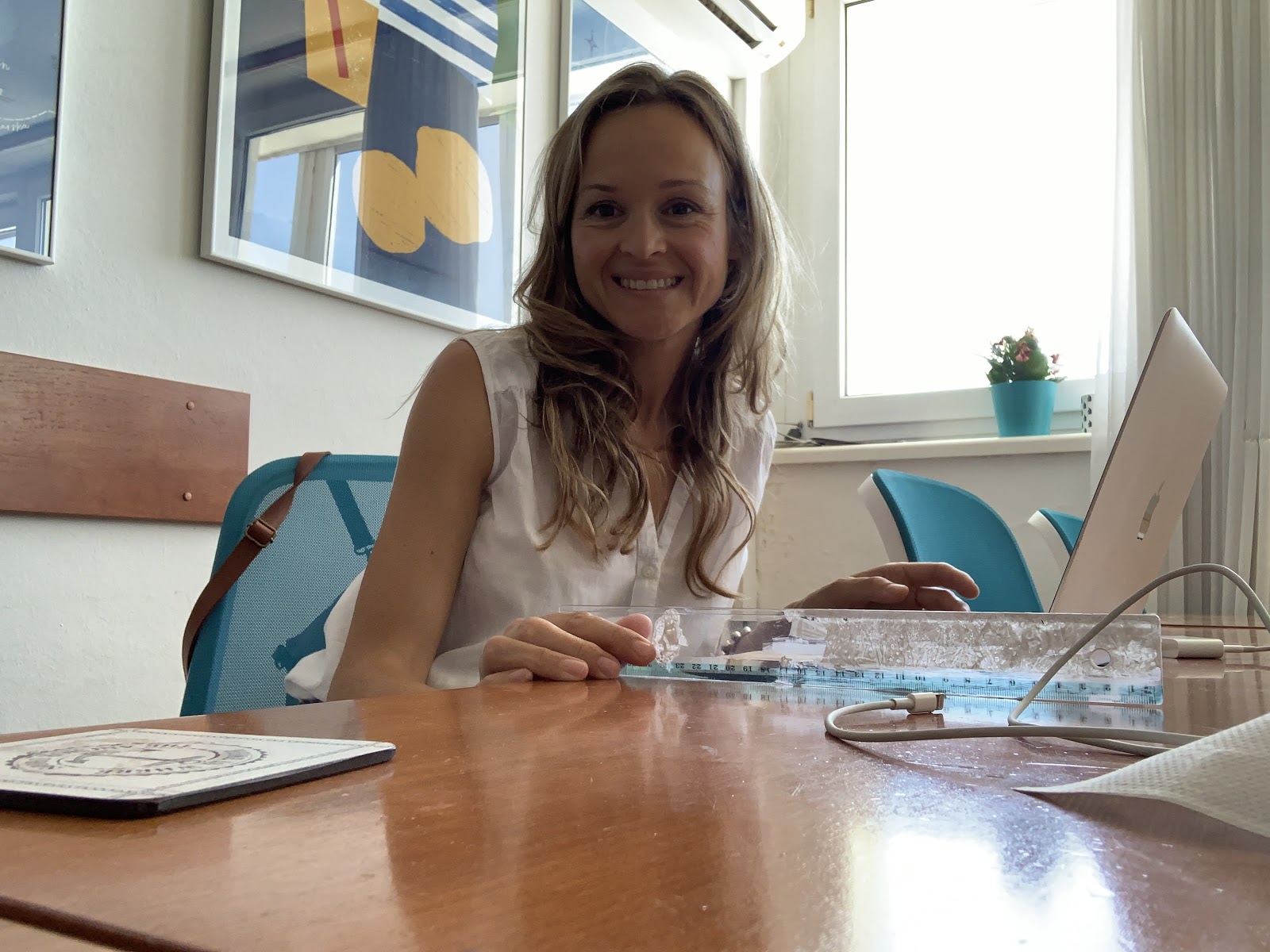
3. What is your impression of the way Croatia is dealing with the crisis? How safe do you feel?
Very safe regarding health matters.
Not so much regarding the coming economic and in turn social implications.
For the social - human responses to fear and lack - and domestic violence - already rampant in any society, is a real concern. I do not feel confident in Croatia in this aspect - policy-wise. Perhaps through EU directives. And of course, some incredible NGOs.
The private sector has really impressed me for standing up and having a unified, strong voice. Based on this instance, I am hopeful there are mega positive changes coming, while also staying realistic. I expect the default Croatian ‘negativity’, ‘favours’ and perception of ‘obstacles’ will prevail.
Even with the new 2 people convening rule, Croatia will remain: “2 people, 3 political parties”. For some time. At least it will be more digital. And this strength will finally be recognised over sun and sea.
4. Now compare that to your home country and how they are handling it. What is Croatia doing better/worse?
It’s difficult to compare, as it’s two very different systems. In some regards, Flintstone vs Jetsons for public services, a culture of calling people out and narratives of the nation. Plus Australia is geographically isolated and Croatia is next to the original European epicentre, Italy. Still, some things stand out.
PANIC BUYING
(I answered this before getting the bonus question).
Australia had a very recent shock to their system - apocalyptic bushfires. This disrupted supply chains and business sectors, particularly tourism. So the panic buying isn’t a total surprise, given the timing.
Croatians (where I am) seem to only have sold out of flour, salt and yeast. Though, I heard the local butcher has now closed. Buying power, ie financial means, is a factor here, too.
In my hometown of Canberra, which is an affluent ‘bubble’, stock in the the fish market was fine, but a lot of other places and shelves were empty.
Overall in Australia I’m happy to read “even the ugly fruit is selling”. Again, hope for better policy and consumer behaviour around local and seasonal supply. Everywhere.
I think food supply is on a lot of people’s minds.
SHUTDOWNS
In Australia, the hospitality sector shutdown and stay home instruction seemed to happen overnight, whereas I felt Croatians saw it coming. I recall knowing a few days ahead cafes, etc would close. This was probably the biggest shock to the system in Australia. Bondi beach on Sunday. Stay home Monday.
Remote work and digital schooling options are also more prolific in Australia. This wasn’t the case in Croatia. Plus there is an over-reliance on tourism here. (Duh).
It’s certainly a wakeup call to diversify in Croatia and make use of competitive advantages among which are the excellent robotics, AI and tech capabilities. Ideal for a newly remote working world.
BUSINESS IMPACT and INFORMATION
There is probably more protection for Australian businesses than here - and business owners aren’t putting all their energies into fighting for their rights on top of re-strategising.
Access to information online is also better in Australia. COVID19 updates have been good in Croatia. For other services, it really shows the system here was not prepared. At all. Phone calls (to unanswered hotlines) and emailing requests is very, very archaic - especially for an EU member state with an international tourist audience.
I sent an email on behalf of someone - and it bounced. The address didn’t even exist. I forwarded it and not even a reply. Pretty sure there are plenty of professional service companies here who could fix this (and build a better solution).
It’s really not acceptable. If this is a sign of things to come, the country will really lag behind.
EMERGENCY RESPONSE
Natural disasters aren’t new to Australia, so there are often emergency rescue measures ready to deploy. From technology, personnel to financial stimuli. I would say they are better organised to react and communicate - but on COVID19, I would say too slow and complacent - initially. This is changing. The gravity of the situation has sunk in. Again, different timelines - even for countries.
For the record, I would feel just as safe health-wise in Australia. Especially my hometown.
OTHER POINTS:
Working from home:
The Australian government saw lockdown coming and bought a lot of laptops. Croatia probably bought more paper and ink.
Social Distancing:
Probably the same response level:

Croatia wins on… Resourcefulness. Australia on Sense of Entitlement.
The resourcefulness and ingenuity of students and sectors here is impressive. Australians - some - bemoan inconveniences and the loss of ‘luxuries’ not available to most people around the world. While winter is the period to watch, I expect countries like Australia to be among the first to bounce back. Croatia, I’m not so sure. And I’m an optimist!
5. What about official communications from the authorities, compared to your home country?
I think the crisis communications here have been delivered as best they can. I know I’m a fan of Vili - and certainly feel better with my health instructions coming from a brain surgeon rather than a career politician. His language is very team-minded. He jokes. He keeps cool.
Australia on the other hand… While the channels are there and resources at hand to deliver them are top notch, there was already a lack of confidence in the guy delivering the message. The mixed-messaging at times also isn’t helpful.
Things feel more settled now, from what I read, and from speaking to people there.
It is a tiring thing to face the public in a crisis, so cutting people slack is also needed. Compassion.
6. What's the one thing you wish you had taken with you into self-isolation.
Am I meant to say more toilet paper…?
My family.
7. One thing you have learned about yourself, and one thing you have learned about others during this crisis.
We either respond with courage and poise or out of fear and lack. Not always immediately, which is human, but it is always our choice. This choice is the one thing we can control.
ABOUT ME:
I’m currently “farm desking” in a Dalmatian village where I see more sheep than people. I’m a dual citizen of Australia and Croatia. This means I have enough toilet paper and alcohol, but now no yeast to make donuts.
As you know, I’m a TCN contributor and collaborator on remote work and digital nomads.
I’m ready for the world to get all medieval again - except with women’s rights this time. And the internet.
I do a few things:
Advocate for remote work and digital nomads.
Communications and international/EU grant programs.
Projects bringing tech into Ag. For growers, supply chains, sustainability, etc.
I have NOT panic-bought 6 months worth of toilet paper.
You can connect with me via LinkedIn or my website tanjapolegubic.com.
Thanks, Tanja, stay safe and see you on the other side.
TCN is starting a new feature series on foreign experiences of sitting out COVID-19 here in Croatia compared to their home country. If you would like to contribute, the questions are below. Please also include a para about yourself and where you are from, and a link to your website if you would like. Please also send 3-4 photos minimum to This email address is being protected from spambots. You need JavaScript enabled to view it. Subject Corona Foreigner
If you would be interested to record a video version for our partners www.rplus.video please let us know in the email. Thanks and stay safe.
Foreigners Self-Isolating in Croatia: Do You Feel Safer Than in Your Home Country?
Firstly, how are you? Are you alone/with someone? Tell us a little about your situation and sanity levels.
What do you think about the economic measures the government is taking, are they helping your business? (PLEASE IGNORE IF THIS DOES NOT AFFECT YOU)
When did you realise that corona was going to be a big issue?
What is your impression of the way Croatia is dealing with the crisis? How safe do you feel?
Now compare that to your home country and how they are handling it. What is Croatia doing better/worse?
What about official communications from the authorities, compared to your home country?
What's the one thing you wish you had taken with you into self-isolation.
One thing you have learned about yourself, and one thing you have learned about others during this crisis.
TCN has recently become a partner in Robert Tomic Zuber's new R+ video channel, initially telling stories about corona experiences. You can see the first TCN contribution from this morning, my video from Jelsa talking about the realities of running a news portal in the corona era below. If you would like to also submit a video interview, please find Robert's guidelines below
VIDEO RECORDING GUIDE
The video footage should be recorded so that the cell phone is turned horizontally (landscape mode).
There are several rules for television and video news:- length is not a virtue- a picture speaks more than a thousand words
In short, this would mean that your story should not last more than 90 seconds and that everything you say in the report should be shown by video (for example, if you talk about empty streets, we should see those empty streets, etc.).
How to do it with your cell phone? First, use a selfie camera to record yourself telling your story for about a minute and a half. Ideally, it would be taken in the exterior, except in situations where you are reporting on things in the interior (quarantine, hospital, self-isolation, etc.). Also, when shooting, move freely, make sure everything is not static.
After you have recorded your report, you should capture footage that will tell your story with a picture, such as an earlier example with empty streets.
One of the basic rules of TV journalism is that the story is told in the same way as a journalist with his text. Therefore, we ask you for additional effort. Because we work in a very specific situation, sometimes you may not be able to capture footage for each sentence of the report. In this case, record the details on the streets: people walking, the main features of the city where you live, inscriptions on the windows related to the virus, etc.
The same rules apply if you are shooting a story from your apartment, self-isolation, quarantine. We also need you to capture footage that describes your story.
When shooting frames to cover your reports, it is important that you change the angle of the shot (in other words, shoot that empty street from several angles). Also, when shooting a detail, count at least five seconds before removing the camera to another detail.
The material should be about 5 minutes long (90 seconds of your report + frames to cover your story).
After recording everything, send us to Zagreb, preferably via WeTransfer to This email address is being protected from spambots. You need JavaScript enabled to view it.
Foreigners Self-Isolating in Croatia: Do You Feel Safer? Liz from Canada in Zagreb
April 3, 2020 - Do foreigners in Croatia feel more or less safe sitting out COVID-19 here than in their home country, and what are their experiences? A new series on TCN, with Liz Hendriksen in Zagreb as our 19th contributor.
Oxford University recently published some research on government responses to coronavirus which showed that Croatia currently has the strictest measures in the world. While inconvenient, this is a good thing in terms of reducing the spread of the virus, and I am certainly not alone in my admiration of the official Croatian handling of this crisis in recent weeks, both in terms of action and communication.
But what do other expats here think? And how does it compare with the response in their home country? Would they rather sit this one out here or there? In the first of a new series on TCN, we will be featuring expats from all over the world to see what their views are on life in corona Croatia rather than back home. So far we have heard from expats in Croatia from Romania, USA, Ireland, UK, Mexico, Argentina, Spain, Singapore, Holland, Canada, India, Hong Kong and Germany. Next up, Eugene Brcic Jones from Australia in Zagreb. Next up, Liz Hendriksen from Canada, currently holed up in Zagreb.
If you would like to contribute to this series, full details are below. Now, over to Liz.
FIRSTLY, HOW ARE YOU? ARE YOU ALONE/WITH SOMEONE? TELL US A LITTLE ABOUT YOUR SITUATION AND SANITY LEVELS.
I’m doing well. I just moved to Zagreb in January after seven years in Salzburg, Austria, so it’s an interesting time to acclimate to a new country and lifestyle.
I live with my husband Klaud and our Dorkie Merina. We’re both working from home and have been for some time now. I am a copywriter with a background marketing and communications. My husband is a transportation designer. As such, it’s no big deal for us to do a home office, we continue to message each other on WhatsApp from the same room, and we’re both sticking to normal work schedules during the day. That could change as the economics of the crisis become more tenuous, but we take things one day at a time. Like everyone else.
Sanity levels are good, though they did take a hit after the earthquake. A cold pint in a dark bar would have been the perfect medicine for us, but now’s not the time.
We walk the dog a lot. Fresh air is a good thing.
WHAT DO YOU THINK ABOUT THE ECONOMIC MEASURES THE GOVERNMENT IS TAKING, ARE THEY HELPING YOUR BUSINESS?
I quite literally finalised opening my small copywriting and marketing business here last week. Great timing, eh?
As such, I’d love to have a better understanding of any stimulus or support measures that the government is offering. Though, as I’ve been here such a short time, I’d be very surprised if I am eligible for anything.
WHEN DID YOU REALISE THAT CORONA WAS GOING TO BE A BIG ISSUE?
Friday, March 13th. That day, my best friend was flying here to visit for a week. I had to get a stamp for my business that morning. On my walk I could see the shops filling with customers stocking up, but the streets were empty. When I returned home from my errand, I got on the phone with LOT Airlines and postponed her trip.
I felt like things were going downhill, and I’m glad I made the decision. Croatia, Canada, and Poland (she changed planes in Warsaw) started instituting restrictions the next day. She would have gotten off the plane and we would have sent her right back.
WHAT IS YOUR IMPRESSION OF THE WAY CROATIA IS DEALING WITH THE CRISIS? HOW SAFE DO YOU FEEL?
I feel quite safe overall. My husband and I have remarked often about how impressed we are with the response here. Restrictions were put in place well ahead of things escalating and communication is solid.
The only concern is that if one of us did get sick, we’ll be somewhere relatively new to us where we don’t speak the language.
NOW COMPARE THAT TO YOUR HOME COUNTRY AND HOW THEY ARE HANDLING IT. WHAT IS CROATIA DOING BETTER/WORSE?
In Canada, the virus is spreading quickly. There is speculation that this is due in part to the large number of Canadians abroad that came home. I get the sense overall however, that the country is managing well enough. In my opinion, that’s due to non-partisan leadership during a crisis.
In terms of what Croatia is doing better? I think the Croatian leaders are doing a better job of implementing measures quickly. Also, the quantities of product in stores is impressive. People in Canada complain about shortages and empty shelves, but they’re also hoarding! I’ve not seen anything like that here.
I don’t think Croatia is doing anything worse than Canada. Perhaps the Prime Minister here could also grow a beard like Justin Trudeau’s? That seems to be helping him look more serious.
WHAT ABOUT OFFICIAL COMMUNICATIONS FROM THE AUTHORITIES, COMPARED TO YOUR HOME COUNTRY?
My feeling is that the official communication from the Croatian government is straightforward, relatively reliable, and being done with regularity.
I get the impression that Canada’s communication frequency – at a federal level – is more-or-less equal to what’s happening here. The difference with Canada is that it is so vast, so on a provincial level the frequency probably varies.
WHAT'S THE ONE THING YOU WISH YOU HAD TAKEN WITH YOU INTO SELF-ISOLATION?
I wish I had a bathtub. I love our apartment, but its only drawback is that it only has a shower. These last few weeks of staying in have made my daydreams of a long soak in a deep tub verge on the inappropriate.
ONE THING YOU HAVE LEARNED ABOUT YOURSELF, AND ONE THING YOU HAVE LEARNED ABOUT OTHERS DURING THIS CRISIS.
One thing I’ve learned about myself is that I am much less introverted than I thought I was. Messaging friends and colleagues on all channels is the highlight of my day.
What I’ve learned about others is a reflection of what I’m learning about the Croatian people in general. How warm, welcoming, and accommodating people can be.
ABOUT ME
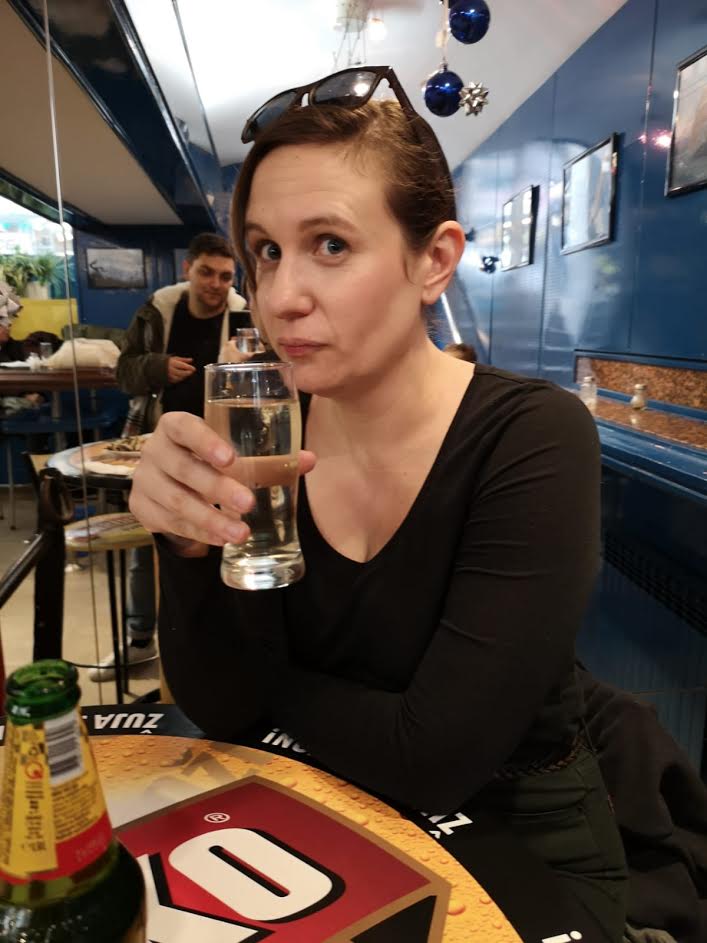
Hey! My name is Liz and I’d currently describe myself as a 37-year old Canadian woman living in Croatia with her husband Klaud and Dorkie Merina. Professionally, I am a copywriter with a background in marketing communications. Personally, I’d describe myself as a good times enthusiast. I.e. a person who likes to pursue what is comfortable and enjoyable in life, while making those closest to her happy. After seven years living and working in Salzburg, Austria, I am looking forward to exploring a new country and new ways of appreciating life.
Thanks, Liz, stay safe and see you on the other side.
TCN is starting a new feature series on foreign experiences of sitting out covid-19 here in Croatia compared to their home country. If you would like to contribute, the questions are below. Please also include a para about yourself and where you are from, and a link to your website if you would like. Please also send 3-4 photos minimum to This email address is being protected from spambots. You need JavaScript enabled to view it. Subject Corona Foreigner
If you would be interested to record a video version for our partners www.rplus.video please let us know in the email. Thanks and stay safe.
Foreigners Self-Isolating in Croatia: Do You Feel Safer Than in Your Home Country?
Firstly, how are you? Are you alone/with someone? Tell us a little about your situation and sanity levels.
What do you think about the economic measures the government is taking, are they helping your business? (PLEASE IGNORE IF THIS DOES NOT AFFECT YOU)
When did you realise that corona was going to be a big issue?
What is your impression of the way Croatia is dealing with the crisis? How safe do you feel?
Now compare that to your home country and how they are handling it. What is Croatia doing better/worse?
What about official communications from the authorities, compared to your home country?
What's the one thing you wish you had taken with you into self-isolation.
One thing you have learned about yourself, and one thing you have learned about others during this crisis.
TCN has recently become a partner in Robert Tomic Zuber's new R+ video channel, initially telling stories about corona experiences. You can see the first TCN contribution from this morning, my video from Jelsa talking about the realities of running a news portal in the corona era below. If you would like to also submit a video interview, please find Robert's guidelines below
VIDEO RECORDING GUIDE
The video footage should be recorded so that the cell phone is turned horizontally (landscape mode).
There are several rules for television and video news:- length is not a virtue- a picture speaks more than a thousand words
In short, this would mean that your story should not last more than 90 seconds and that everything you say in the report should be shown by video (for example, if you talk about empty streets, we should see those empty streets, etc.).
How to do it with your cell phone? First, use a selfie camera to record yourself telling your story for about a minute and a half. Ideally, it would be taken in the exterior, except in situations where you are reporting on things in the interior (quarantine, hospital, self-isolation, etc.). Also, when shooting, move freely, make sure everything is not static.
After you have recorded your report, you should capture footage that will tell your story with a picture, such as an earlier example with empty streets.
One of the basic rules of TV journalism is that the story is told in the same way as a journalist with his text. Therefore, we ask you for additional effort. Because we work in a very specific situation, sometimes you may not be able to capture footage for each sentence of the report. In this case, record the details on the streets: people walking, the main features of the city where you live, inscriptions on the windows related to the virus, etc.
The same rules apply if you are shooting a story from your apartment, self-isolation, quarantine. We also need you to capture footage that describes your story.
When shooting frames to cover your reports, it is important that you change the angle of the shot (in other words, shoot that empty street from several angles). Also, when shooting a detail, count at least five seconds before removing the camera to another detail.
The material should be about 5 minutes long (90 seconds of your report + frames to cover your story).
After recording everything, send us to Zagreb, preferably via WeTransfer to This email address is being protected from spambots. You need JavaScript enabled to view it.
HTZ: Drop of 53% in Overnight Stays in March 2020 Consequence of Epidemic
ZAGREB, April 3, 2020 - According to data from eVisitor, there were 118,200 tourists in Croatia in March, or 75% fewer on the year, while the number of overnight stays decreased by 53%, which confirms that the COVID-19 pandemic has had a negative impact on tourism, says Croatian Tourist Board (HTZ) director Kristjan Staničić.
In the first three months of 2020, 635,000 tourists visited Croatia and generated nearly 1.9 million overnight stays, which are respective decreases of 33% and 20% compared with the same period in 2019.
Of the 118,200 tourist arrivals in March, about 65,000 were foreign tourists, which is a drop of 80.3% compared with March 2019, and they generated 64.5% fewer overnight stays, or nearly 280,000.
The biggest number of overnight stays was generated by domestic tourists, and tourists from Bosnia and Herzegovina, Germany, Slovenia and Austria.
There were 53,300 domestic tourists and they generated 238,800 overnight stays, which are respective decreases of 60.7% and 24.2% compared with March 2018.
Commercial accommodation facilities accounted for 72% of tourism turnover, while non-commercial facilities accounted for the remaining 28%, seeing an increase compared with March last year, the HTZ has underscored.
About 110,000 overnight stays were generated in commercial accommodation facilities, a decline of over 60%, and nearly 8,000 overnight stays were generated in non-commercial accommodation, an increase of 110%.
Staničić said that at this point it was too early to forecast demand for the peak season (July, August and September), underscoring that intensive work will be done to promote and position Croatia as a safe country once adequate conditions have been achieved.
"The focus will be on the domestic market and on those who can reach Croatian destinations by road," Staničić said.
More tourism news can be found in the Travel section.
Coronavirus is Armageddon for Hospitality Sector
ZAGREB, April 3, 2020 - Turnover in the hospitality sector has dropped over 90% in the two weeks since the closure of establishments and due to social distancing and uncertainty about reopening, the COVID-19 pandemic is "Armageddon" for the sector, says the president of the national association of bar and restaurant owners.
Locally and globally, bar and restaurant owners will be the hardest hit by this pandemic, Marin Medak tells Hina, voicing more concern about "what will happen, because recent estimates that at least 30% of establishments could be open in early July are no longer that optimistic, especially for restaurants and all other establishments where food is prepared and served."
He says the turnover drop of over 90% in accommodation and restaurants in the last week of March is expected but also shocking because the prospects for the next two to three weeks, possibly longer, are very bad.
That's why, he says, he calls the impact of COVID-19 on restaurants, cafes, bars, catering and the entire hospitality sector as "Armageddon" because they have very limited possibilities to keep or repurpose their business.
"Absolutely everything or nearly everything has stopped. Some restaurants deliver food or operate drive-ins, but that accounts for only... 3 to 6% of the turnover which, combined with the demanding measures for the protection of delivery people and delivery in general, is untenable for many, as well as expensive."
Medak says bar and restaurant owners will utilise government aid for staff and business.
The hospitality sector employs about 110,000 people, nearly half of all those employed in tourism and hospitality, according to his association.
Some employers have decided to keep their staff but many, notably small ones, simply can't if their turnover is zero kuna, which is now the case with almost everyone.
Since it is difficult to expect any business in the hospitality sector before the summer, Medak says his association and the Entrepreneurs' Voice initiative believe that payments should be written off, not deferred.
If the sector manages to do some business in July, August and the rest of the year, it will hardly exceed five to seven billion kuna, and the annual decline could be about 70%, he says.
Even when movement restrictions are lifted and bars and restaurants reopen, it will be tough on them because the question is how much customers will be able to afford, Medak says, adding that it might be easier for cafes with outdoor space.
"If restrictions are lifted by summer, we propose cancelling motorway tolls so that people in Croatia can drive more and visit various destinations and thus be able to more easily afford what the hospitality sector offers."
More coronavirus news can be found in the Lifestyle section.
Unions Call for Shortening Working Hours to Save Jobs
ZAGREB, April 3, 2020 - The SSSH union federation on Friday called on the government to utilise the proposed instrument to reduce working hours that the European Commission has launched in addition to national regulations for the protection of workers and to assist entrepreneurs in bridging this crisis without layoffs.
The EC has proposed a new model for temporary Support to mitigate Unemployment Risks in an Emergency (SURE) worth up to €100 billion which should be adopted at its meeting next week, and it contains short term measures to help protect jobs and workers affected by the coronavirus crisis.
Joining the European Confederation of Trade Unions (ETUC) appeal sent to finance ministers in EU member states and the EU Council, the SSSH union called on the government to support the initiative and to adopt national regulations which would protect workers with public finances and in that way help businesses to bridge the crisis without laying off workers or reducing their salaries.
SURE is urgently needed to prevent huge layoffs, decrease in workers' income and a recession, SSSH concluded.
More economic news can be found in the Business section.

